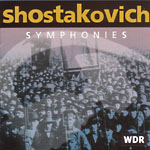What can you get for $22 these days? Well, in New York City that would buy you two movie tickets and maybe a candy bar. Most other places you could get a decent meal (for one) at your local no-frills restaurant. But these are fleeting pleasures. What if I told you that for $22 you could get an 11-CD set of the complete Shostakovich symphonies, which would provide countless hours of enjoyment for many years to come? Well it’s true. And not only that, Rudolf Barshai’s WDR Symphony Orchestra cycle (recorded 1994-2000 in Cologne) is one of the best all around sets available, with idiomatic playing that approaches that of great Russian orchestras and masterful conducting by a man who knew and worked closely with the composer. If you need more convincing, check out the following quick overview.
No. 1: Crystalline textures and tight phrasing characterize this performance, emphasizing the work’s neo-classical style (less so it’s darkly emotional side). No. 2: The playing is fleet, propulsive, and colorful, which is exactly what this “steel age” music needs; and the Rundfunkchor sings with revolutionary fervor at the conclusion, clearly articulating the text. No. 3: Barshai shapes this rambling work into a somewhat coherent musical discourse, but even his sensitive conducting cannot redeem the bland and tasteless choral ending. No. 4: A smart, biting performance with highly characterful playing from the orchestra. The strings really “kick” in the first movement’s whirlwind fugato. The recording’s lack of low bass is the only drawback.
No. 5: Barshai’s interpretation is stern yet elegant, and his emphasis on the work’s classical proportions brilliantly points up the symphony’s relationship to Beethoven (as well as Mahler). No. 6: A great performance; Barshai shapes the first movement beautifully, illuminating the the music’s underlying passion; the Scherzo is the fastest ever, and it’s perfectly played, as is the mercurial finale; great percussion throughout. No. 7 “Leningrad”: A tight, taut opening to what will be a smoothly flowing rendition that’s high on feeling but a little short on bombast (which may be a plus for some listeners). No. 8: Profoundly moving, communicating the work’s tragic time in history; Barshai draws some particularly hair-raising sounds from the WDR woodwinds. No. 9: Magnificent; Shostakovich’s subversive, Haydnesque wit and underlying anxiety is made perfectly plain; wonderful brass playing. No. 10: A lithe, lean, and dramatic reading, with powerful climaxes; the Scherzo is less frantic than some, but no less ferocious. No. 11 “The Year 1905”: Another triumph; Barshai redeems this symphony by reaching beyond the surface cinematography to find the tragic grandeur just beneath.
No. 12 “The Year 1917”: Fast tempos give the music an unusual dramatic impetus that outshines the rather foursquare melodic material; clearly this piece works better when it’s short and sweet. No. 13 “Babi Yar”: A gripping, intense, take-no-prisoners performance; Barshai draws forth powerfully dark and rich low orchestral sonorities, creating palpable feelings of fear and anxiety while generating tremendous climaxes; bass Sergei Alekshaskin is the voice of authority, doom, and compassion, and he’s supported by the Moscow Choral Academy’s ferociously powerful singing; this performance alone is worth the price of the set. No. 14: A masterful interpretation from the man who premiered the work. The string playing is stunning, while Alla Simoni and Vladimir Vaneev realize the music’s bitter irony, grim tragedy, and profound sadness in their passionate, at times neurotic performances. No. 15: Barshai’s light touch emphasizes the music’s droll qualities and flies directly in the face of ironic and angst-ridden portrayals by Neeme Järvi and Kurt Sanderling; the finale is spectacular.
There you have it, and add to this overall clear, impactful, and nicely reverberant recorded sound and you’ve got one great Shostakovich cycle. Even though in some cases I lean toward Rozhdestvensky’s hysterically intense renderings on Melodiya (while I don’t necessarily warm to the screechy sound of those recordings), Barshai’s intelligent, humane, passionate, and deeply felt readings undeniably realize the composer’s intentions and certainly will stand the test of time. This Brilliant Classics set is such a bargain you almost feel guilty paying so little for it. So now, the choice is yours: you can order this fabulous, eternally rewarding collection of music by one of the 20th century’s greatest composers (available in the U.S. from Berkshire Record Outlet), or you can go out for a sandwich at your local diner. . . [2/10/2002]
































